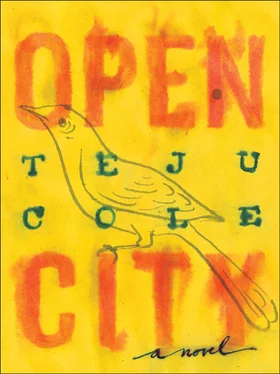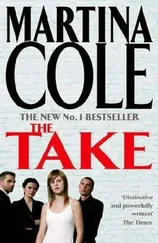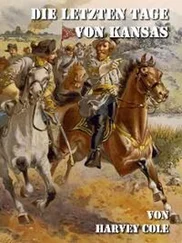for Karen
and for Wah-Ming and Beth
PART 1. Death is a perfection of the eye
And so when I began to go on evening walks last fall, I found Morningside Heights an easy place from which to set out into the city. The path that drops down from the Cathedral of St. John the Divine and crosses Morningside Park is only fifteen minutes from Central Park. In the other direction, going west, it is some ten minutes to Sakura Park, and walking northward from there brings you toward Harlem, along the Hudson, though traffic makes the river on the other side of the trees inaudible. These walks, a counterpoint to my busy days at the hospital, steadily lengthened, taking me farther and farther afield each time, so that I often found myself at quite a distance from home late at night, and was compelled to return home by subway. In this way, at the beginning of the final year of my psychiatry fellowship, New York City worked itself into my life at walking pace.
Not long before this aimless wandering began, I had fallen into the habit of watching bird migrations from my apartment, and I wonder now if the two are connected. On the days when I was home early enough from the hospital, I used to look out the window like someone taking auspices, hoping to see the miracle of natural immigration. Each time I caught sight of geese swooping in formation across the sky, I wondered how our life below might look from their perspective, and imagined that, were they ever to indulge in such speculation, the high-rises might seem to them like firs massed in a grove. Often, as I searched the sky, all I saw was rain, or the faint contrail of an airplane bisecting the window, and I doubted in some part of myself whether these birds, with their dark wings and throats, their pale bodies and tireless little hearts, really did exist. So amazed was I by them that I couldn’t trust my memory when they weren’t there.
Pigeons flew by from time to time, as did sparrows, wrens, orioles, tanagers, and swifts, though it was almost impossible to identify the birds from the tiny, solitary, and mostly colorless specks I saw fizzing across the sky. While I waited for the rare squadrons of geese, I would sometimes listen to the radio. I generally avoided American stations, which had too many commercials for my taste — Beethoven followed by ski jackets, Wagner after artisanal cheese — instead tuning to Internet stations from Canada, Germany, or the Netherlands. And though I often couldn’t understand the announcers, my comprehension of their languages being poor, the programming always met my evening mood with great exactness. Much of the music was familiar, as I had by this point been an avid listener to classical radio for more than fourteen years, but some of it was new. There were also rare moments of astonishment, like the first time I heard, on a station broadcasting from Hamburg, a bewitching piece for orchestra and alto solo by Shchedrin (or perhaps it was Ysaÿe) which, to this day, I have been unable to identify.
I liked the murmur of the announcers, the sounds of those voices speaking calmly from thousands of miles away. I turned the computer’s speakers low and looked outside, nestled in the comfort provided by those voices, and it wasn’t at all difficult to draw the comparison between myself, in my sparse apartment, and the radio host in his or her booth, during what must have been the middle of the night somewhere in Europe. Those disembodied voices remain connected in my mind, even now, with the apparition of migrating geese. Not that I actually saw the migrations more than three or four times in all: most days all I saw was the colors of the sky at dusk, its powder blues, dirty blushes, and russets, all of which gradually gave way to deep shadow. When it became dark, I would pick up a book and read by the light of an old desk lamp I had rescued from one of the dumpsters at the university; its bulb was hooded by a glass bell that cast a greenish light over my hands, the book on my lap, the worn upholstery of the sofa. Sometimes, I even spoke the words in the book out loud to myself, and doing so I noticed the odd way my voice mingled with the murmur of the French, German, or Dutch radio announcers, or with the thin texture of the violin strings of the orchestras, all of this intensified by the fact that whatever it was I was reading had likely been translated out of one of the European languages. That fall, I flitted from book to book: Barthes’s Camera Lucida , Peter Altenberg’s Telegrams of the Soul , Tahar Ben Jelloun’s The Last Friend , among others.
In that sonic fugue, I recalled St. Augustine, and his astonishment at St. Ambrose, who was reputed to have found a way to read without sounding out the words. It does seem an odd thing — it strikes me now as it did then — that we can comprehend words without voicing them. For Augustine, the weight and inner life of sentences were best experienced out loud, but much has changed in our idea of reading since then. We have for too long been taught that the sight of a man speaking to himself is a sign of eccentricity or madness; we are no longer at all habituated to our own voices, except in conversation or from within the safety of a shouting crowd. But a book suggests conversation: one person is speaking to another, and audible sound is, or should be, natural to that exchange. So I read aloud with myself as my audience, and gave voice to another’s words.
In any case, these unusual evening hours passed easily, and I often fell asleep right there on the sofa, dragging myself to bed only much later, usually at some point in the middle of the night. Then, after what always seemed mere minutes of sleep, I was jarred awake by the beeping of the alarm clock on my cellphone, which was set to a bizarre marimba-like arrangement of “O Tannenbaum.” In these first few moments of consciousness, in the sudden glare of morning light, my mind raced around itself, remembering fragments of dreams or pieces of the book I had been reading before I fell asleep. It was to break the monotony of those evenings that, two or three days each week after work, and on at least one of the weekend days, I went out walking.
At first, I encountered the streets as an incessant loudness, a shock after the day’s focus and relative tranquillity, as though someone had shattered the calm of a silent private chapel with the blare of a TV set. I wove my way through crowds of shoppers and workers, through road constructions and the horns of taxicabs. Walking through busy parts of town meant I laid eyes on more people, hundreds more, thousands even, than I was accustomed to seeing in the course of a day, but the impress of these countless faces did nothing to assuage my feelings of isolation; if anything, it intensified them. I became more tired, too, after the walks began, an exhaustion unlike any I had known since the first months of internship, three years earlier. One night, I simply went on and on, walking all the way down to Houston Street, a distance of some seven miles, and found myself in a state of disorienting fatigue, laboring to remain on my feet. That night I took the subway home, and instead of falling asleep immediately, I lay in bed, too tired to release myself from wakefulness, and I rehearsed in the dark the numerous incidents and sights I had encountered while roaming, sorting each encounter like a child playing with wooden blocks, trying to figure out which belonged where, which responded to which. Each neighborhood of the city appeared to be made of a different substance, each seemed to have a different air pressure, a different psychic weight: the bright lights and shuttered shops, the housing projects and luxury hotels, the fire escapes and city parks. My futile task of sorting went on until the forms began to morph into each other and assume abstract shapes unrelated to the real city, and only then did my hectic mind finally show some pity and still itself, only then did dreamless sleep arrive.
Читать дальше












